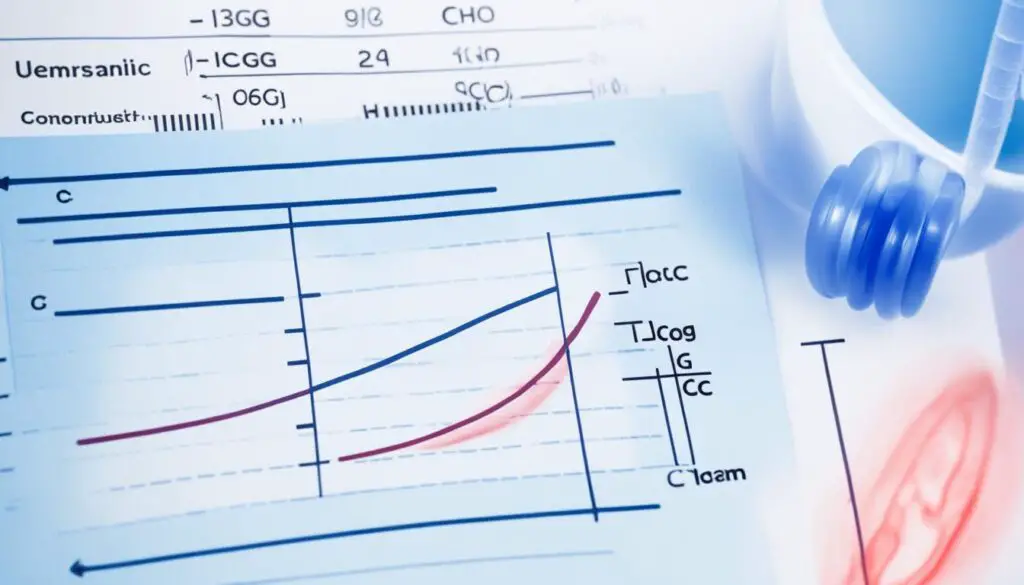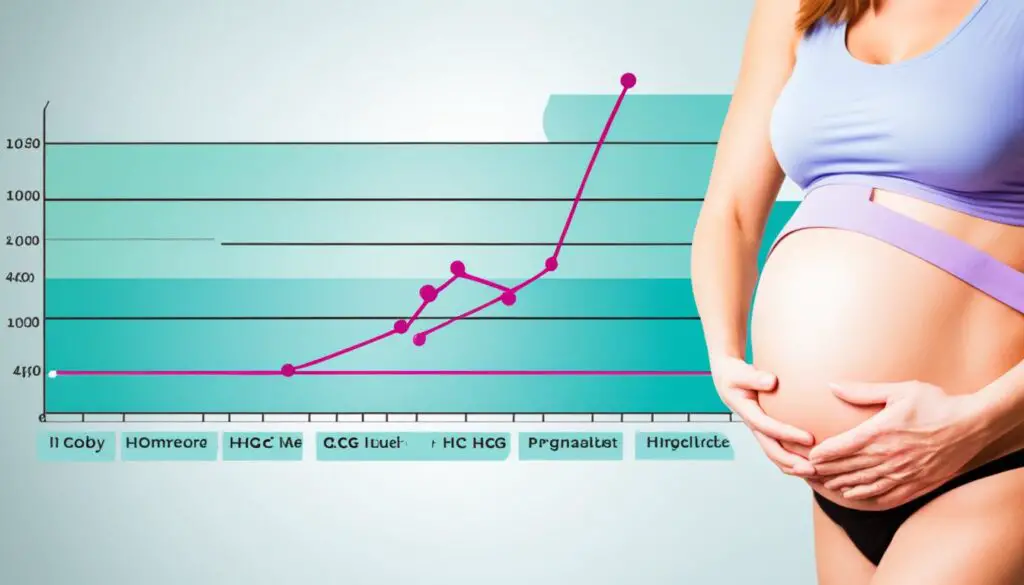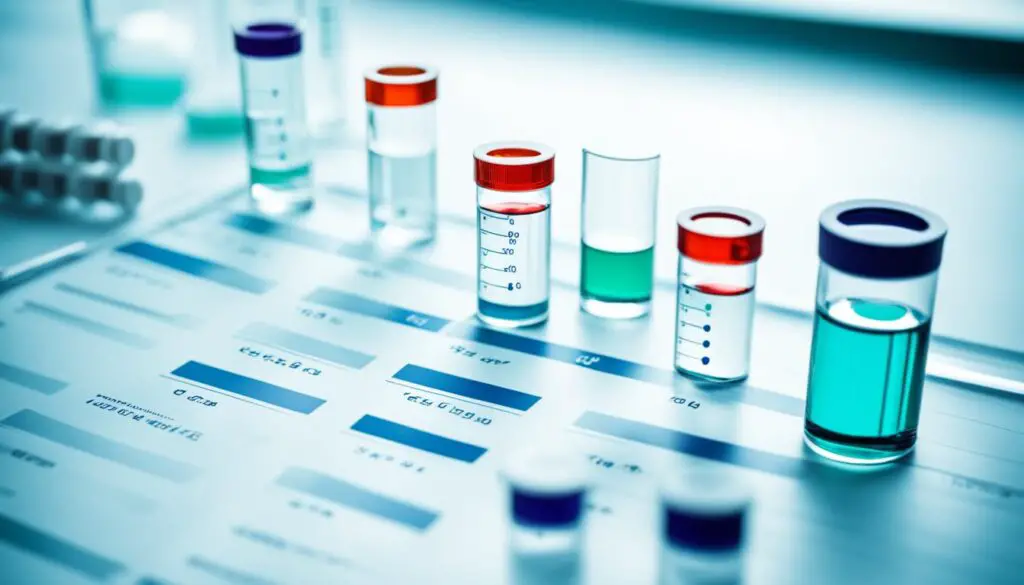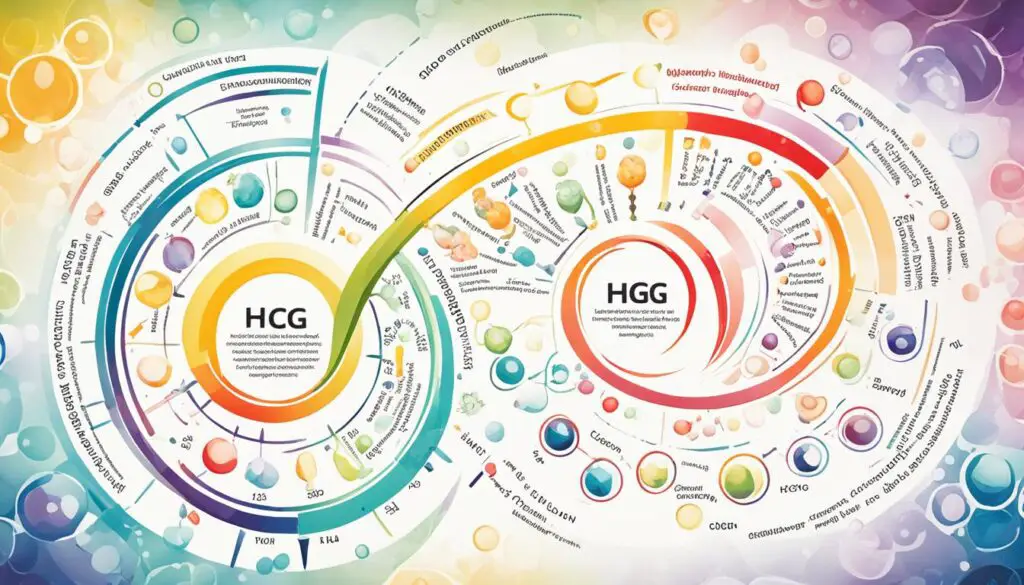When it comes to hormone regulation, one hormone stands out for its significant impact: human chorionic gonadotropin, or HCG. But what exactly is the relationship between HCG and hormones? Does HCG influence hormone levels, and if so, how?
Understanding the effects of HCG on hormone levels is crucial, especially for women during pregnancy and individuals undergoing fertility treatments. HCG plays a vital role in promoting hormone production, maintaining healthy pregnancies, and supporting the development of eggs and ovulation. But is there more to HCG’s influence on hormones than meets the eye?
In this article, we will explore the intricate relationship between HCG and hormones. We will delve into the effects of HCG on hormone production, discuss its impact on hormonal balance, and shed light on the specific hormonal changes caused by HCG. So, let’s investigate the remarkable role of HCG in hormone regulation and uncover the truth behind its influence on our bodies.
Key Takeaways:
- HCG, or human chorionic gonadotropin, plays a crucial role in hormone regulation.
- HCG promotes hormone production, particularly progesterone in women during pregnancy.
- Abnormal levels of HCG can indicate multiple pregnancies, ectopic pregnancy, miscarriages, and certain medical conditions.
- HCG injections are used in infertility treatments to stimulate ovulation and increase the chance of conception.
- While the HCG diet gained popularity for weight loss, there is no scientific evidence supporting its effectiveness, and the FDA has declared it harmful and illegal.
The Role of hCG in Infertility
Infertility can be a challenging and emotional journey for many individuals and couples. Fortunately, advancements in medical technology have provided various treatment options to help overcome fertility issues. One such treatment is the use of hCG hormone injections, which play a crucial role in enhancing fertility and increasing the chances of conception.
When it comes to infertility, hCG injections are often administered alongside other medications to stimulate the ovaries and promote the development of mature eggs. By stimulating ovulation, these injections help create the ideal conditions for fertilization to occur.
The hCG hormone is typically administered as a trigger shot, which induces ovulation within approximately 36 hours. This precise timing is crucial for maximizing the chances of successful conception. The injection of hCG mimics the natural surge of the hormone that occurs during the menstrual cycle, signaling the ovaries to release mature eggs.
“The hCG hormone injections serve as a powerful tool in fertility treatments, boosting the chances of successful conception,” says Dr. Emily Roberts, a renowned fertility specialist.
Not only does hCG play a pivotal role in ovulation, but it also contributes to the development of eggs. The hormone’s presence helps support the growth and maturation of the eggs within the ovaries, making them more viable for fertilization.
The use of hCG injections for infertility treatment has been approved by the U.S. Food and Drug Administration (FDA), highlighting its effectiveness and safety in assisting couples with their conception goals.
Image depicts an illustration of a syringe with a vial of the hCG hormone, representing the administration of hCG injections for infertility.
The Impact of hCG on Pregnancy

During pregnancy, hCG hormone production begins immediately after the fertilized egg implants into the uterine wall. It takes 8 to 14 days for hCG levels to increase sufficiently in the blood and urine, confirming pregnancy through at-home tests.
The primary function of hCG in pregnancy is to promote the production of progesterone by the ovaries until the placenta is well developed. Progesterone is essential for maintaining a healthy pregnancy and preventing miscarriages. Without adequate levels of progesterone, the uterine lining may shed and cause the pregnancy to end prematurely.
During the early stages of pregnancy, when the placenta is not yet producing significant levels of progesterone, hCG helps sustain the pregnancy by providing the necessary hormonal support. As the pregnancy progresses and the placenta develops, it takes over the production of progesterone, and the levels of hCG start to decline.
It’s important to note that the levels of hCG in the blood and urine can vary widely among pregnant women. Some women may have higher or lower levels of hCG without it indicating any problems with the pregnancy. The specific range of hCG levels considered normal may differ depending on the gestational age and individual factors.
Monitoring hCG levels during early pregnancy can provide valuable information about the viability and progression of the pregnancy. If hCG levels do not rise appropriately or decline, it may indicate a potential issue, such as an ectopic pregnancy or a nonviable pregnancy.
Role of hCG in Progesterone Production
The relationship between hCG and progesterone is crucial for maintaining a healthy pregnancy. In the early stages, hCG stimulates the ovaries to produce progesterone, which is necessary for the implantation of the fertilized egg and the development of the uterine lining. As the pregnancy progresses, the placenta takes over the production of progesterone, and hCG levels decrease.
| Role of hCG | Role of Progesterone |
|---|---|
| Stimulates the ovaries to produce progesterone until the placenta is developed | Maintains the uterine lining and supports the growth and development of the fetus |
| Ensures the continued development of the corpus luteum, which produces progesterone | Prevents the shedding of the uterine lining and helps establish a stable pregnancy |
| Supports early fetal development and the growth of the placenta | Prevents contractions of the uterus that could lead to miscarriage |
Overall, hCG plays a critical role in pregnancy by promoting progesterone production, maintaining the viability of the pregnancy, and supporting the growth and development of the fetus and placenta.
hCG and Weight Loss
The hCG diet is a weight loss method that gained popularity due to its combination of daily hCG hormone injections and a very low-calorie diet. While some have claimed that hCG promotes weight loss by boosting metabolism and targeting stubborn fat, there is no scientific evidence to support these claims.
The weight loss achieved through the hCG diet is primarily attributed to the ultra-low-calorie diet itself rather than the hCG hormone. By restricting calorie intake to as low as 500 calories per day, individuals on this diet are likely to experience significant weight loss.
However, it is important to note that the U.S. Food and Drug Administration (FDA) has deemed the use of hCG injections for weight loss as harmful and illegal. The FDA warns against using hCG for weight loss due to potential risks and the lack of evidence supporting its effectiveness in treating obesity.
“The use of hCG injections for weight loss has not been supported by scientific evidence, and these products are illegal.” – FDA spokesperson
The hCG Diet: Ultra-Low-Calorie and Some Risks
The hCG diet typically involves a strict regimen of consuming a very low number of calories, often combined with hCG hormone injections. The calorie restriction is intended to stimulate weight loss, while the hCG injections are believed to suppress hunger and enhance fat metabolism.
Although some people may experience initial weight loss on the hCG diet, it is important to consider the potential risks. Severely restricting calorie intake can lead to nutritional deficiencies, muscle loss, fatigue, and a slowed metabolism. Furthermore, the use of hCG injections for weight loss can result in adverse effects, such as blood clots and ovarian hyperstimulation syndrome (OHSS), a condition characterized by enlarged ovaries and fluid accumulation in the abdomen.
table {
border-collapse: collapse;
width: 100%;
margin-top: 20px;
}
th, td {
text-align: left;
padding: 8px;
}
th {
background-color: #f2f2f2;
}
th, td {
border-bottom: 1px solid #ddd;
}
| Benefits of the hCG diet | Risks of the hCG diet |
|---|---|
|
|
It is important to prioritize long-term, sustainable weight loss methods that focus on balanced nutrition, regular physical activity, and lifestyle modifications. Consultation with a healthcare professional, such as a registered dietitian or physician, is recommended before embarking on any weight loss program.
Abnormal Levels of hCG

Abnormal levels of hCG, or human chorionic gonadotropin, can provide valuable insights into various conditions. Whether in pregnancy or nonpregnant women, deviations from normal hCG levels can indicate underlying issues and prompt further investigation.
In the context of pregnancy, high levels of hCG may be indicative of multiple pregnancies, including twins or triplets. While this brings the joy of welcoming multiple babies, it also increases the risks and complexities associated with such pregnancies. On the other hand, low levels of hCG in pregnancy can signal potential complications like ectopic pregnancy or miscarriages. Monitoring hCG levels during the early stages of pregnancy is crucial in assessing the viability and progress of the pregnancy.
Interestingly, hCG is not exclusively produced during pregnancy. Nonpregnant women may also exhibit moderate to high levels of hCG in certain medical conditions. Malignancies in breast, ovarian, kidney, lung, gastrointestinal tract, and trophoblastic diseases can lead to abnormal hCG production. In such cases, hCG serves as a tumor marker in blood and urine tests, aiding in the diagnosis and monitoring of these conditions.
“Abnormal levels of hCG can serve as important indicators of various conditions, highlighting the complexities of pregnancy and the potential presence of underlying malignancies.”
It is crucial to interpret hCG levels in the appropriate clinical context, considering the individual’s medical history and symptoms. Healthcare professionals utilize hCG testing and monitoring to make informed decisions regarding pregnancy management, fertility treatments, and the identification of potential health issues.
Side Effects of Injectable hCG
When it comes to using injectable hCG, it’s important to be aware of the potential side effects and complications that may arise. While hCG can be an effective treatment option in certain situations, it’s vital to understand the risks involved.
Blood Clots Formation
One of the possible side effects of injectable hCG is the formation of blood clots. The use of hCG injections can increase the risk of blood clots, which can pose serious health complications. It’s essential to monitor for any signs or symptoms of blood clot formation, such as swelling, redness, pain, or warmth in the affected area.
Ovarian Hyperstimulation Syndrome (OHSS)
Another potential complication of injectable hCG is ovarian hyperstimulation syndrome (OHSS). OHSS occurs when the ovaries are overstimulated by the injected hormones, resulting in enlarged ovaries and the accumulation of fluid in the abdominal cavity. This condition can be uncomfortable and even life-threatening in severe cases. Close medical supervision is necessary during hCG treatment to monitor for any signs or symptoms of OHSS, such as abdominal pain, bloating, nausea, and difficulty breathing.
Multiple Pregnancies
The use of hCG injections can also increase the chances of multiple pregnancies. While this may be desirable for some individuals undergoing fertility treatments, multiple pregnancies come with increased risks and complications for both the mother and babies. It is crucial to discuss the potential risks and benefits of multiple pregnancies with a healthcare provider before initiating hCG treatment.
It’s important to note that the side effects and complications mentioned above are not exhaustive. Each individual may respond differently to hCG treatment, and it’s essential to consult with a healthcare professional to understand the specific risks and monitor for any adverse reactions.
What is Human Chorionic Gonadotropin (hCG)?

Human chorionic gonadotropin (hCG) is a hormone produced by the placenta during pregnancy. It plays a crucial role in supporting the pregnancy by stimulating the production of progesterone, which is vital for maintaining the uterine lining and preventing menstruation. hCG also promotes the thickening of the uterine lining, providing a nurturing environment for the developing embryo.
One of the significant functions of hCG is its role in confirming pregnancy. hCG can be detected in urine or blood approximately 10 to 11 days after conception. Its levels rise rapidly in the first trimester before declining as the pregnancy progresses. The detection of hCG through pregnancy tests provides valuable information about the progress and viability of the pregnancy.
Measuring hCG levels can also aid in diagnosing pregnancy-related complications. Abnormal hCG levels may indicate potential issues such as ectopic pregnancy or miscarriage. By monitoring hCG levels, healthcare professionals can assess the well-being of the pregnancy and take appropriate measures to ensure the best possible outcome.
hCG Detection Tests
To detect hCG levels, two types of tests are commonly used: blood tests and urine tests. Blood tests are more accurate and can detect lower levels of hCG, providing a more precise measurement. They are often used in medical environments to monitor hCG levels during pregnancy.
“Measuring hCG levels can confirm pregnancy, provide information on the progress of pregnancy, and assist in the diagnosis of pregnancy-related complications.”
Urine tests, on the other hand, are widely available for at-home use and provide a quick and convenient way to detect hCG levels. These tests are typically less sensitive than blood tests, which can lead to false negatives if done too early in pregnancy or if the hCG levels are low.
hCG Levels in Early Pregnancy
In early pregnancy, hCG levels increase rapidly. They typically double every 48 to 72 hours during the first few weeks of pregnancy. Elevated hCG levels are a positive sign of a progressing pregnancy. However, the exact values of hCG levels can vary widely among individuals. Healthcare providers consider the rate of increase and the overall trend of hCG levels rather than relying solely on specific numeric values.
How is hCG Used for Fertility?

When it comes to fertility treatments, hCG injections play a vital role in increasing the chances of conception. These injections are commonly used in conjunction with in-vitro fertilization (IVF) or intrauterine insemination (IUI) procedures.
During IVF, hCG is administered to stimulate ovulation and trigger the release of mature eggs from the ovaries. This is a critical step in the IVF process, as it allows for the collection of viable eggs for fertilization in the laboratory. The hCG injection is typically given at a specific time in the IVF treatment cycle to ensure optimal egg quality and success.
In the case of IUI, hCG injections can also be used to induce ovulation. This procedure involves placing prepared sperm directly into the uterus to enhance the chances of fertilization. By using hCG to stimulate ovulation, the timing of the IUI procedure can be precisely coordinated with the release of the eggs.
Monitoring hCG Levels for Successful Fertility Treatments
Once hCG is administered, monitoring the levels of this hormone in the body is crucial for assessing the success of fertility treatments. Elevated hCG levels indicate successful ovulation and the potential for pregnancy. This monitoring is especially important for individuals with a history of infertility, as it allows healthcare professionals to closely track progress and make any necessary adjustments to the treatment plan.
To measure hCG levels, blood tests are typically conducted. These tests can provide accurate and quantitative information about the concentration of hCG in the bloodstream. The results help determine whether ovulation has occurred and whether pregnancy has been achieved. Furthermore, hCG levels can be monitored in the early stages of pregnancy to ensure proper development and detect any potential complications.
In addition to blood tests, home pregnancy tests that detect hCG in urine are widely available. While these tests can provide preliminary indications of pregnancy, they are generally less sensitive and accurate than blood tests. For a definitive diagnosis, it is recommended to consult with a healthcare professional and undergo blood testing.
| Fertility Treatment | Procedure |
|---|---|
| In-Vitro Fertilization (IVF) | hCG injections are used to induce ovulation and trigger the release of mature eggs for fertilization in the laboratory. |
| Intrauterine Insemination (IUI) | hCG injections are administered to stimulate ovulation, allowing for the precise timing of the procedure and increased chances of fertilization. |
Overall, the use of hCG in fertility treatments has proven to be an effective strategy, improving the odds of successful conception. By stimulating ovulation and ensuring optimal timing, hCG injections play a crucial role in increasing the chances of pregnancy for individuals seeking assisted reproductive technologies.
Detecting and Testing hCG Levels

When it comes to monitoring hCG levels, there are two primary methods of testing: blood tests and urine tests. These tests play a crucial role in confirming pregnancy, assessing the progress of pregnancy, and detecting potential complications along the way. Let’s explore the different types of tests and how they help interpret hCG results.
1. Blood Tests for hCG
Blood tests offer a more accurate assessment of hCG levels compared to urine tests. They have the ability to detect even small amounts of hCG in the bloodstream. Blood tests can be further categorized into qualitative and quantitative tests.
Qualitative Blood Tests determine the presence or absence of hCG in the blood. These tests are commonly used to confirm pregnancy or rule out other conditions. However, they do not provide specific hCG level measurements.
Quantitative Blood Tests measure the exact amount of hCG in the blood. These tests provide valuable information about the progression of pregnancy and can help identify potential issues such as ectopic pregnancies or miscarriages.
2. Urine Tests for hCG
Urine tests, commonly known as at-home pregnancy tests, are a convenient and affordable option for detecting hCG levels. However, it’s important to note that urine tests may have limitations in detecting early or low levels of hCG. These tests rely on the concentration of hCG in the urine, which can vary depending on factors such as hydration levels and the time of day.
While urine tests are suitable for initial pregnancy confirmation, blood tests are recommended for accurate hCG level measurements.
Interpreting hCG Results
Interpreting hCG test results involves comparing hCG levels over time, known as sequential testing. This helps healthcare professionals assess the progress of pregnancy, determine the viability of the pregnancy, and identify potential complications.
It’s important to keep in mind that hCG levels can vary widely among individuals and pregnancy stages. Consulting with a healthcare provider or specialist is crucial for accurate interpretation and appropriate medical decisions.
| Testing Method | Pros | Cons |
|---|---|---|
| Blood Tests |
|
|
| Urine Tests |
|
|
“Accurate hCG level testing is crucial for monitoring pregnancy progression and detecting potential complications. Blood tests offer greater accuracy and quantitative measurements compared to urine tests. Sequential testing over time provides valuable insights for interpreting hCG results and making informed medical decisions.”
Factors Affecting hCG Testing
When it comes to hCG testing, several factors can interfere with the accuracy of the results, leading to false positives or false negatives. It is crucial to be aware of these factors and consider them when interpreting hCG test results to ensure accurate diagnosis and appropriate treatment decisions.
Ectopic Production of hCG
In some cases, hCG may be produced outside of pregnancy, leading to false positive results. This ectopic production of hCG can occur in certain medical conditions such as trophoblastic disease or certain types of cancer. It is important for healthcare professionals to investigate further if elevated hCG levels are detected in non-pregnant individuals.
Heterophile Antibodies and Rheumatoid Factors
Heterophile antibodies and rheumatoid factors are substances that can interfere with hCG testing, resulting in false positive results. These antibodies and factors can be present in the blood of certain individuals, leading to inaccurate hCG measurements. To mitigate this interference, laboratories often use specific test methods that minimize the impact of these substances.
Early Testing after Conception
Testing for hCG too early after conception can result in false negative results. It takes time for hCG levels to rise sufficiently in the body, and testing too soon may not detect the hormone. It is advisable to wait for a sufficient amount of time after conception before undergoing hCG testing to ensure accurate results.
Dilute Urine Specimens
Dilute urine specimens can also lead to false negative results in hCG testing. When urine is diluted, the concentration of hCG may fall below the threshold of detection, resulting in a negative test result even if hCG is present in the body. It is recommended to use concentrated urine samples or perform blood tests for hCG if there is a suspicion of pregnancy despite negative urine test results.
“Hook Effect”
The “hook effect” is a phenomenon that can occur when hCG levels are extremely high, saturating the testing system. In this case, the testing system may not be able to accurately measure the true hCG levels, leading to false negative results. Healthcare professionals should be aware of this possibility and consider dilution techniques or alternative testing methods to overcome the hook effect.
By understanding and accounting for these interfering factors in hCG testing, healthcare professionals can ensure accurate interpretation of hCG test results, leading to better diagnosis and appropriate treatment decisions.
Clinical Significance of hCG

The clinical significance of hCG (human chorionic gonadotropin) levels extends beyond its role in confirming pregnancy. By monitoring hCG levels, healthcare professionals can evaluate the viability and progression of pregnancies, as well as identify potential complications.
In the evaluation of pregnancy, hCG levels are crucial in determining the health of the developing fetus. Abnormal levels of hCG may indicate nonviable pregnancies or ectopic pregnancies, where the fertilized egg implants outside the uterus. Early intervention and appropriate management are essential in these cases to ensure the well-being of the mother and her pregnancy.
Furthermore, hCG plays a significant role in trophoblastic diseases, such as hydatidiform mole and choriocarcinoma. These conditions involve the abnormal growth of cells in the placenta, requiring close monitoring of hCG levels to assess tumor mass and evaluate the effectiveness of treatment.
Additionally, hCG testing in nonpregnant patients can provide valuable diagnostic information. Persistent positive hCG testing in nonpregnant individuals may suggest the presence of testicular cancer, ovarian cancer, or other malignancies. Detecting hCG in the absence of pregnancy warrants further investigation to determine the underlying cause and guide appropriate medical intervention.
Overall, hCG levels have significant clinical significance, enabling healthcare professionals to evaluate pregnancies, manage trophoblastic diseases, and facilitate the early detection of certain malignancies. The monitoring and interpretation of hCG levels play a vital role in providing accurate diagnoses and guiding appropriate treatment decisions.
“Monitoring hCG levels enables healthcare professionals to evaluate the viability and progression of pregnancies and detect potential complications early on.”
Conclusion
Understanding the effects of hCG on hormone levels is crucial in medical and reproductive health. hCG plays a vital role in hormone regulation, supporting the development and maintenance of pregnancies. During pregnancy, hCG promotes the production of progesterone and helps maintain a healthy pregnancy. It also aids in the detection and diagnosis of pregnancy-related complications.
However, it is important to note that the use of hCG for weight loss is not scientifically supported. The FDA has declared hCG injections for weight loss as unsafe and illegal. The weight loss achieved through the hCG diet is likely due to the ultra-low-calorie diet, rather than the hormone itself.
When interpreting hCG test results, it is crucial to consider individual factors and potential interfering factors that may affect the accuracy of the test. False positives and false negatives can occur, and understanding these factors is necessary for proper diagnosis and treatment planning.
In conclusion, hCG plays a significant role in hormone regulation, pregnancy, and fertility treatments. While it has valuable clinical applications, it is essential to use hCG responsibly and within approved medical guidelines. Understanding the relationship between hCG and hormone levels is key to ensuring the well-being of patients and providing effective healthcare.
FAQ
How does hCG affect hormone levels?
hCG plays a crucial role in hormone regulation, particularly in women during pregnancy. It promotes the production of progesterone by the ovaries, supporting egg development and stimulating ovulation.
What is the role of hCG in infertility?
hCG injections are often used in combination with other drugs to stimulate the ovaries and trigger ovulation, increasing the chances of conception in infertility treatments.
How does hCG impact pregnancy?
hCG production begins after the fertilized egg implants in the uterine wall. It helps maintain a healthy pregnancy by promoting progesterone production, supporting the early stages of pregnancy before the placenta can produce significant progesterone levels.
Does hCG help with weight loss?
There is no scientific evidence supporting the use of hCG for weight loss. The weight loss achieved with the hCG diet is likely due to the low-calorie diet it entails, rather than the hormone itself.
What do abnormal levels of hCG indicate?
High levels of hCG can indicate multiple pregnancies, while low levels may suggest ectopic pregnancy or miscarriages. In nonpregnant women, moderate to high levels of hCG can be a sign of malignancies such as breast, ovarian, kidney, lung, gastrointestinal tract, and trophoblastic disease.
What are the side effects of injectable hCG?
Injectable hCG can lead to the formation of blood clots and ovarian hyperstimulation syndrome (OHSS), a potentially life-threatening condition. It can also increase the chances of multiple pregnancies.
What is human chorionic gonadotropin (hCG)?
hCG is a hormone produced by the placenta during pregnancy. It supports pregnancy by stimulating progesterone production, thickening the uterine lining, and preventing menstruation.
How is hCG used for fertility?
hCG injections can be used in conjunction with in-vitro fertilization (IVF) or intrauterine insemination (IUI) to stimulate ovulation, increasing the chances of conception.
How are hCG levels detected and tested?
hCG levels can be detected through blood and urine tests. Blood tests are more accurate and can measure specific amounts of hCG, while urine tests are common for at-home pregnancy tests.
What factors can affect hCG testing?
Factors such as ectopic production of hCG, heterophile antibodies, rheumatoid factors, or certain medical conditions can lead to false positives. Early testing after conception, diluted urine specimens, or extremely high hCG levels can result in false negatives.
What is the clinical significance of hCG?
Monitoring hCG levels is important for pregnancy evaluation, assessing tumor mass in trophoblastic diseases, and identifying certain malignancies in nonpregnant patients.
How does hCG affect hormone levels?
hCG plays a crucial role in hormone regulation, particularly in women during pregnancy. It promotes the production of progesterone by the ovaries, supporting egg development and stimulating ovulation.




